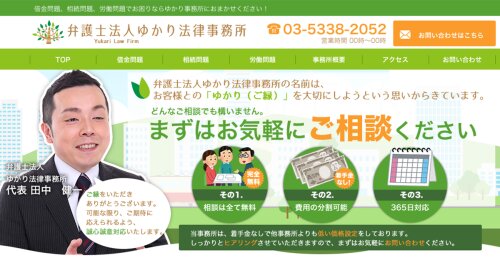Best Collaborative Law Lawyers in Tokyo
Share your needs with us, get contacted by law firms.
Free. Takes 2 min.
Free Guide to Hiring a Family Lawyer
List of the best lawyers in Tokyo, Japan
About Collaborative Law in Tokyo, Japan
Collaborative Law is a legal approach designed to facilitate amicable settlements in disputes, especially within the realm of family law, without resorting to contentious court proceedings. In Tokyo, Japan, this method is gaining recognition for its focus on negotiation and cooperation between parties, often with the assistance of trained professionals and attorneys who are committed to finding a mutually satisfactory resolution. It’s particularly appealing in a culture that values harmony and discretion in personal and business relations.
Why You May Need a Lawyer
Engaging in the collaborative law process requires legal representation that is not only well-versed in Japanese law but also specifically trained in the collaborative process. Common situations where you might require or benefit from a lawyer include divorce, child custody arrangements, and business or personal disputes where a private resolution is preferred. Lawyers facilitate negotiations, ensure that agreements comply with Japanese law, and help avoid potential legal pitfalls that can arise during the collaborative process.
Local Laws Overview
While the Japanese legal system does not specifically codify collaborative law like some Western jurisdictions, the principles of negotiation, mediation, and reconciliation are embedded within family law and commercial law practices. The civil code and family registration law govern disputes related to divorce, inheritance, and family relations, while commercial law governs business disputes. Lawyers trained in collaborative methods apply these laws within the framework of negotiated agreements that meet the interests of all parties.
Frequently Asked Questions
What is the difference between collaborative law and mediation?
Collaborative law involves each party having their own attorney advocating on their behalf in a cooperative setting, whereas mediation involves a neutral third party helping the disputing parties find a mutually acceptable resolution.
How long does the collaborative law process take in Tokyo?
The duration varies based on the complexity of the case and the willingness of the parties to cooperate. It can range from a few weeks to several months.
Is the collaborative law process confidential?
Yes, privacy and confidentiality are key advantages of choosing collaborative law in Japan, aligning with the cultural emphasis on discretion.
Can any lawyer practice collaborative law?
While any licensed lawyer can theoretically participate, it’s advisable to work with attorneys specifically trained in collaborative practices for the best outcomes.
What happens if the collaborative process fails?
If parties cannot reach an agreement, they may have to resort to litigation. Typically, the lawyers involved in the collaborative process will not represent the parties in court to maintain the process’s integrity.
Are agreements reached through collaborative law legally binding?
Yes, once an agreement is reached and properly documented, it can be made legally binding and enforceable in a court of law.
Can collaborative law be used for business disputes?
Absolutely, collaborative law can effectively resolve business disputes, especially where maintaining a future working relationship is desirable.
Is collaborative law expensive?
While costs depend on many factors, collaborative law processes can often be less expensive than traditional litigation due to their efficiency and speed.
How do I find a collaborative lawyer in Tokyo?
Look for lawyers or firms that specifically mention collaborative law training and experience. Legal associations may also have listings or referrals.
Can international or cross-border disputes be handled through collaborative law in Tokyo?
Yes, provided that all parties agree to the process, and the lawyers involved have an understanding of the applicable international laws and regulations.
Additional Resources
Those seeking further information on collaborative law in Tokyo, Japan, may find the following resources helpful:
- The Japan Federation of Bar Associations (JFBA) - Offers referrals and information on legal services.
- The Tokyo Family Court - Provides information on family dispute resolution.
- Non-profit organizations specializing in mediation and collaborative law - These can be valuable sources for workshops, training, and networking events focused on collaborative practices.
Next Steps
If you require legal assistance in collaborative law, the first step is to consult with a lawyer experienced in collaborative practice. They can assess your situation, explain your options, and guide you through the process. Remember, choosing a collaborative approach involves commitment from all parties to work cooperatively towards a mutually beneficial outcome.
Lawzana helps you find the best lawyers and law firms in Tokyo through a curated and pre-screened list of qualified legal professionals. Our platform offers rankings and detailed profiles of attorneys and law firms, allowing you to compare based on practice areas, including Collaborative Law, experience, and client feedback.
Each profile includes a description of the firm's areas of practice, client reviews, team members and partners, year of establishment, spoken languages, office locations, contact information, social media presence, and any published articles or resources. Most firms on our platform speak English and are experienced in both local and international legal matters.
Get a quote from top-rated law firms in Tokyo, Japan — quickly, securely, and without unnecessary hassle.
Disclaimer:
The information provided on this page is for general informational purposes only and does not constitute legal advice. While we strive to ensure the accuracy and relevance of the content, legal information may change over time, and interpretations of the law can vary. You should always consult with a qualified legal professional for advice specific to your situation.
We disclaim all liability for actions taken or not taken based on the content of this page. If you believe any information is incorrect or outdated, please contact us, and we will review and update it where appropriate.














